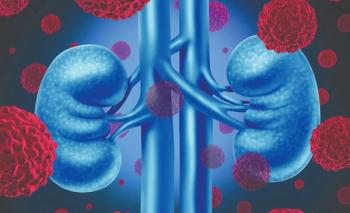
Choueiri Discusses Updated KEYNOTE-564 Results of Adjuvant Pembrolizumab in RCC
At 2022 ASCO GU, Toni K. Choueiri, MD, explained the data seen in the updated results from the KEYNOTE-564 trial for patients with renal cell carcinoma.
During the
Transcript:
We had 6 more months of follow-up on KEYNOTE-564 , [which] is the first adjuvant study in renal cell cancer to show a benefit of immunotherapy with the PD-1 inhibitor pembrolizumab. [Those] with resected renal cell cancer at risk for recurrence received 1 year of pembrolizumab or placebo. During the 2021 ASCO [American Society of Clinical Oncology Annual Meeting] plenary session, we presented our initial results that showed a hazard ratio for the primary end point of disease-free survival [DFS] of .68 [95% CI, 0.53-0.87; P = .001], a 32% decrease in the risk of recurrence or death. With 6 additional [months of] follow-up and more events, the hazard ratio became .63 [95% CI, 0.50-0.80; nominal P < .0001], a 37% decrease in the risk of recurrence or death. [This showed a] very stable and strong DFS.2
When we looked at a subgroup analysis, and we excluded patients with T4 or resected nodal or metastatic disease, the hazard ratio [remained] .68 and didn’t cross 1.00, which is still a clinically relevant and statistically significant difference. We saw a benefit across sarcomatoid histology and subgroup. With 6 more months, there was no new safety signals. These results are reassuring and reconfirm pembrolizumab as an option in the adjuvant treatment of renal cell cancer for patients at risk for recurrence.
We’ve had very few events; we’re still at only 33% of [a necessary] 200 OS [overall survival] events, and the hazard ratio of .5 is still stable. These are also encouraging to see. We also looked at the time of onset for immune-related adverse effects, and all of them on average were less than were measured in weeks. It’s overall reassuring and
References
1. Choueiri TK, Tomczak P, Park SH, et al. Pembrolizumab as post nephrectomy adjuvant therapy for patients with renal cell carcinoma: Results from 30-month follow-up of KEYNOTE-564. J Clin Oncol. 2022;40(suppl 6):290. doi: 10.1200/JCO.2022.40.6_suppl.290
2. Choueiri TK, Tomczak P, Park SH, et al. Pembrolizumab versus placebo as post-nephrectomy adjuvant therapy for patients with renal cell carcinoma: Randomized, double-blind, phase III KEYNOTE-564 study. J Clin Oncol. 2021;39(suppl_15):LBA5. doi: 10.1200/JCO.2021.39.15_suppl.LBA5
3. FDA approves pembrolizumab for adjuvant treatment of renal cell carcinoma. News Release. November 17, 2021. Accessed February 28, 2022. https://bit.ly/3svLSTu
Newsletter
Stay up to date on recent advances in the multidisciplinary approach to cancer.















































